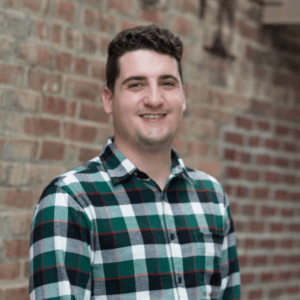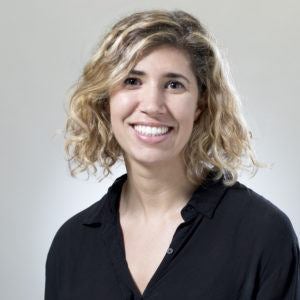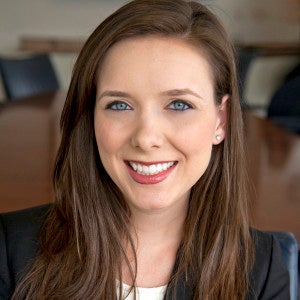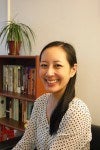Read our alumni stories!
If you are an alum of the Concentration and would like to be featured on this page, please contact the HCC Coordinator.

Justin Kaplan, MPH
Science Writer
Division of Philanthropy, Dana-Farber Cancer Institute
Please briefly describe your position.
As a Science Writer in the Division of Philanthropy, my job involves compiling complex research and clinical updates and translating them into palatable reports for high level donors. A lot of my time is spent interviewing Dana-Farber physicians and scientists about their incredible work—much of which is funded by donors—as well as keeping up-to-date with current events in the ever-changing world of cancer medicine. When I’m not interviewing, researching, editing, or writing, I also assist colleagues in the Division who do not have a science background with understanding and contextualizing recent research.
How do you use health communication in your position?
My training in health communication has been vital to my success as a Science Writer. Whenever I am drafting prose for a lay audience, I think critically about the key message I am trying to convey, how to minimize academic jargon, and what framing would be most meaningful to donors.
What advice would you give to students interested in health communication?
Use your time at Harvard wisely—especially your time outside the classroom. Research and work opportunities are ample at Chan, and much of my most salient learning happened while working on extracurricular projects with professors (like Andy Tan!). Graduate school is the perfect time to explore new areas of interest while simultaneously developing marketable skills.
Also, I highly recommend reflecting on your post-Harvard goals early and often. If you have a career path in mind, pursue opportunities that bolster your relevant job experience. Do not spend all your time studying. A great GPA, while nice, is meaningless if you have no work experience!

Lauren Southwick, MPH
Research Project Manager
Penn Medicine Center for Digital Health
Please briefly describe your position.
I manage two research projects that leverage social media and digital data to inform health care delivery.
How do you use health communication in your position?
I often return to health communication theories, specifically patient-centered communication and principles to inform study design and patient materials. In particular, message framing, social norms (injunctive and descriptive), behavioral economics, and health literacy tests have been especially helpful.
What advice would you give to students interested in health communication as they begin their career at Harvard Chan?
I suggest reaching out to your professors and TA to learn about their research and career path.
Kelly D. Blake, Sc.D.
Health Scientist and Program Director
Health Communication and Informatics Research Branch (primary)
Tobacco Control Research Branch (secondary)
Behavioral Research Program
Division of Cancer Control and Population Sciences
National Cancer Institute
National Institutes of Health
Career before and after HSPH
Kelly D. Blake is a health scientist and program director in the National Cancer Institute’s Health Communication and Informatics Research Branch, with a secondary appointment in the Tobacco Control Research Branch. She directs a program of research on media effects and serves as part of the management team for NCI’s Health Information National Trends Survey (HINTS) (http://hints.cancer.gov/). Her research examines how media exposure influences health behavior and attitudes toward public health policy. She also examines social determinants of health, focusing on how communication inequalities and knowledge gaps exacerbate health disparities among disadvantaged populations.
Prior to re-joining NCI in 2009, Dr. Blake was a cancer prevention fellow and research assistant at the Dana-Farber Cancer Institute (2005-2009), working in the Viswanath Lab while she pursued her doctoral training. During that time, she also did private consulting work in health communication and served as a teaching fellow at the Harvard School of Public Health and Harvard Kennedy School of Government. Before that, she served as a science writer and editor in NCI’s Division of Cancer Control and Population Sciences, Office of the Director (2001-2005), and prior to that, she was a hospital-based public health educator and site coordinator for the West Virginia Rural Health Education Partnerships Program (1997-2001), and a health communication research fellow at the Centers for Disease Control and Prevention, National Institute for Occupational Safety and Health (1996-1997).
Tell me about your current job, and how do you feel about it.
The best thing about my job at NCI is that I not only get to pursue my own lines of scientific inquiry, but I also work with PIs at academic institutions and cancer centers around the country to conceptualize their NIH grant proposals and study aims. It really makes my day when one of “my” grantees’ projects gets funded, and I get to watch the science progress over the life of the grant. It’s also great to be at NCI and be involved in setting the agenda for behavioral research at the national level – to be at the table to advocate for the importance of health communication science and multilevel interventions in cancer prevention and control.
What was the best thing about HCC?
The best thing about the Health Communication Concentration at HSPH was Vish’s leadership and his enthusiasm for his students’ research questions and ideas. His experience and knowledge exposed me to theories and frameworks from disciplines that might not have otherwise been covered in the public health curriculum.
How has HCC helped your career after HSPH?
I think the HCC gave me exposure to a lot of great scholars and thinkers who are grounded in traditional communication research, but innovative and nimble enough to apply it to the changing communication environment and an array of public health problems and settings.
Message to prospective students
It’s very easy to get bogged down with all the required reading, homework assignments, exams, etc., but try not to miss opportunities to go to great talks and network with people outside your department. Also, your time at HSPH is what you make of it. If you come to your faculty prepared to discuss research questions and how best to pursue them, they will give you good feedback and direction if they know you have thought seriously about your topic.
Emma Rodgers, S.M.
Senior Program Manager, Bronx Health REACH / Institute for Family Health
Career before and after HSPH
Before HSPH, I was an Associate Director of Planning and Buying at HN Media & Marketing in NYC. In this position, I managed online, outdoor, and print media buys for the NYC Department of Health & Mental Hygiene, NY State Department of Health and other clients. After HSPH, I wanted more experience in community organizing and policy work, so I took a position as the Bronx Borough Organizer for the NYC Coalition for a Smoke-Free City. In this role, I helped develop, implement and evaluate citywide and Bronx-focused tobacco control campaigns and coordinated the coalition’s communications work.
Tell me about your current job, and how do you feel about it.
In collaboration with faith-based and health organizations, schools, residents, government agencies and community leaders, I help lead community-based public health programs that aim to eliminate racial and ethnic disparities in health outcomes in the Bronx. This includes overseeing grants from the CDC that focus on increasing opportunities for healthy eating and active living and reducing exposure to second hand smoke and excessive and underage drinking. The work is very challenging and exciting. It allows me to pursue my many interests and strengthen a variety of skills. I feel extremely fortunate to work with amazing partners on such important issues.
What was the best thing about HCC?
The classes. I had a lot of practical experience in health communications from my work as a media buyer and planner in NYC, but I wanted to have a better understanding of the theories behind the campaigns and how to evaluate them. The coursework provided this background. Also, Dr. Viswanath was a wonderful mentor! It was very challenging to go back to school after working for four years. Dr. Viswanath provided great support and encouragement while I was at HSPH and helped me figure out what I wanted to do with my career.
How has HCC helped your career after HSPH?
While I am not directly working in the health communications field right now, I find that I use the skills that I acquired in the HCC every day. Communications is a large part of all public health initiatives and a skill set that all organizations, large and small, are looking for their employees to have. Also, media and marketing campaigns are a large part of most major grants. My academic and professional background in health communications has allowed me to lead these initiatives and will only provide more opportunities in the future.
Message to prospective students
Identify a mentor and learn as much as you can from them. Also, don’t be afraid to lean on them for support. HSPH can be very overwhelming! Most of the professors are very busy, but they will make time for you if you are persistent. Finally, take advantage of all opportunities where you can apply what you’re learning in the classroom to the real world. I helped develop a media campaign while interning at the Boston Public Health Commission. I learned a tremendous amount through this experience and it greatly influenced what I wanted to do after HSPH.
Ayano Ogawa, S.M.
Research Associate, Institute of Medicine, Washington, D.C.
Career before and after HSPH
Prior to HSPH, I received my BA in Public Health from Johns Hopkins University and worked on child health and health education projects in Baltimore, South Africa, Taiwan, and Bangladesh. During HSPH, I pursued my interest in health communication, child health, and global health at Sesame Workshop (the non-profit organization behind Sesame Street), where I developed stakeholder engagement strategies for Sesame Global Health Initiative and recommended ways to build accessible health messages designed to instill healthy habits in children and their caregivers in South Asia and West Africa. After HSPH, my career has focused on strategic communication of evidence-based health information to decision-makers at USAID and other federal agencies.
Tell me about your current job, and how do you feel about it.
I am a Research Associate at Institute of Medicine (IOM), a non-profit that provides unbiased and authoritative advice to decision-makers and the public. Currently, I support a consensus study sponsored by the FDA that will assess the use of individual-based models to improve the effect of tobacco regulation policies on public health. IOM is an intellectually stimulating environment, where I have the privilege to work with leading scholars who shape public health priorities and policies, and have the opportunity to apply the skills I gained from HSPH and HCC.
What was the best thing about HCC?
The chair of HCC, Dr. Viswanath, has continually inspired me, even after I have graduated from HSPH. As one of the top leaders of health communication in the world, he has provided me with tools to develop communication strategies that would empower people to make informed health decisions, and positively affect behavior change from the ground to policy level. He has also been a wonderful mentor, who has taken the time to help me explore my career options and build my professional network. Additionally, I loved taking the variety of courses HCC offers. As I took courses from not only HSPH but also other Harvard faculties, I have expanded the way I think and practice health communication. I gained a range of communication skills through a multidisciplinary approach, such as how to design, implement and evaluate health information tailored to different kinds of populations (HSPH and HGSE), strategically communicate health issues to policy makers (HKS), and negotiate with diverse stakeholders in public health (FAS).
How has HCC helped your career after HSPH?
The skills I gained from HCC inform most of the tasks I do in my career thus far. I frequently apply what I learned from the concentration to facilitate stakeholder decision-making, and translate complex health data into easily accessible information so my audience can clearly understand relevant options and next steps.
Message to prospective students
I would encourage prospective students to consider concentrating in health communication. HCC offers a multitude of skills that are useful for any public health professional working in the nonprofit, for-profit or public sector. For me, I rely on the tools I have acquired from HCC at a non-profit health policy organization. HCC also helps students boost interpersonal communication skills and critically interact with health information disseminated in an environment that is increasingly overwhelmed with conflicting health messages.

Marie Katz, S.M.
Consultant, Research and Insights, The Advisory Board Company
Career before and after HSPH
Before HSPH, I conducted strategic analyses at The Amundsen Group, an IMS Health Company focused on commercial issues in the U.S. pharmaceutical industry. Most of my work at The Amundsen Group was quantitative—analyzing large pharmaceutical claims data sets. While at HPSH, I became interested in qualitative research, and, since graduating from HSPH, I have focused my career in qualitative research in health care.
Tell me about your current job, and how do you feel about it.
I’m currently a Consultant in the Research and Insights division of The Advisory Board Company. In my position, I lead research studies for the target audience of health care executives at hospitals and health care systems. The research topics at The Advisory Board Company vary from more strategic areas (such as how to succeed as a population health manager) to more operational topics (such as how to reduce hospital operating costs without compromising care quality). I’m lucky that my work is interesting and challenging—and that it has a meaningful impact on patient care.
What was the best thing about HCC?
Dr. Viswanath. He brings the perfect intersection of health communication theory, research, and real world application to the classroom. His passion for the research and application of health communication theories is inspiring. Dr. Viswanath’s commitment to the students in HCC is exceptional: he always makes time to serve as a mentor for HCC students.
How has HCC helped your career after HSPH?
HCC taught me how to construct clear, concise messages geared toward a target audience, and that has greatly helped me in my career. And more specifically, I’m applying what I learned through HCC in terms of behavior change communication through one of my current projects, in which I’m developing a Patient-Centered Communication Toolkit to help frontline nurses better communicate with patients about their care plans.
Message to prospective students
There are three main things I’d recommend for your time at HSPH. First, find a faculty member who has similar research interests as you. Chances are, there’s a professor at HSPH who is actively studying what you’re interested in—don’t be shy about reaching out to that faculty member. You won’t regret it. Second, take advantage of the guest lectures. I wish I had done this more when I was a student! After graduation, you truly don’t get the same opportunity to easily hear leaders in public health speak on a regular basis. Third and finally, if you’re considering HCC, take the introductory HCC course and see how you feel about it. Concentrating in HCC was the best decision I made while at HSPH to get where I am in my career today. After taking the introductory HCC course, I think you’ll be able to tell whether or not it’s a good fit for your career interests.






